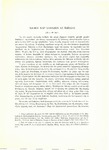Χαλκή χειρ Σαβαζίου εξ Εδέσσης

Προβολή/Άνοιγμα
Συγγραφέας
Καραμανώλη-Σιγανίδου, ΜαίρηΗμερομηνία
1967Γλώσσα
el
Εκδότης
Υπηρεσία Αρχαιοτήτων και Αναστηλώσεως
Λέξη-κλειδί
Βιβλιογραφικά στοιχεία
Αρχαιολογικόν Δελτίον, 1967, Τόμος 22, Μελέται/Μέρος Α’, 149-155.
Πρόσβαση
ελεύθερη
Τίτλος περιοδικού
Αρχαιολογικόν Δελτίον
Επιτομή
This bronze hand, which belongs to the cult of the thracophrygian god Sabazios,
was accidentally found at Edessa in 1957 (now in the Archaeological Museum of Thessaloniki,
inv. no 5094).
The cult of Sabazios in Greece was known from the 5th century B.C. At the beginning
Sabazios was identified with Dionysos, later on, in roman period, he was connected with
eastern deities (Attis, Men, Mithra, Cybele etc.) as is proved from the common symbols
represented on several monuments.
The hand from Edessa, ht. 0,14 m., makes the usual gesture of the blessing hand,
having the three first fingers streched and the last two bent on the palm of the hand. Various
symbols are placed all around the hand; a pine cone on top of the streched fingers.
A snake around the wrist ready to drink from a small crater. There are also a lizard, a
frog, a ram’s head, a turtle and a small stick. The inside of the lower part of the hand is
hollow, for being attached on a stuif.
This hand, which is the only one fo und in Greece, is dated in the first or second century
A.D.
Here is also published a sheet of gold in the shape of a feather, having as emblem
the face of Helios (?) (Museum of Thessaloniki, inv. no 3923, 1. 0,094m, w. 0,022m).
The correlating to identical objects found at Tekiya of Jugoslavia and Carnuntum of
Austria proves that probably this gold feather of the Thessaloniki Museum belongs to the
cult of Sabazios.


